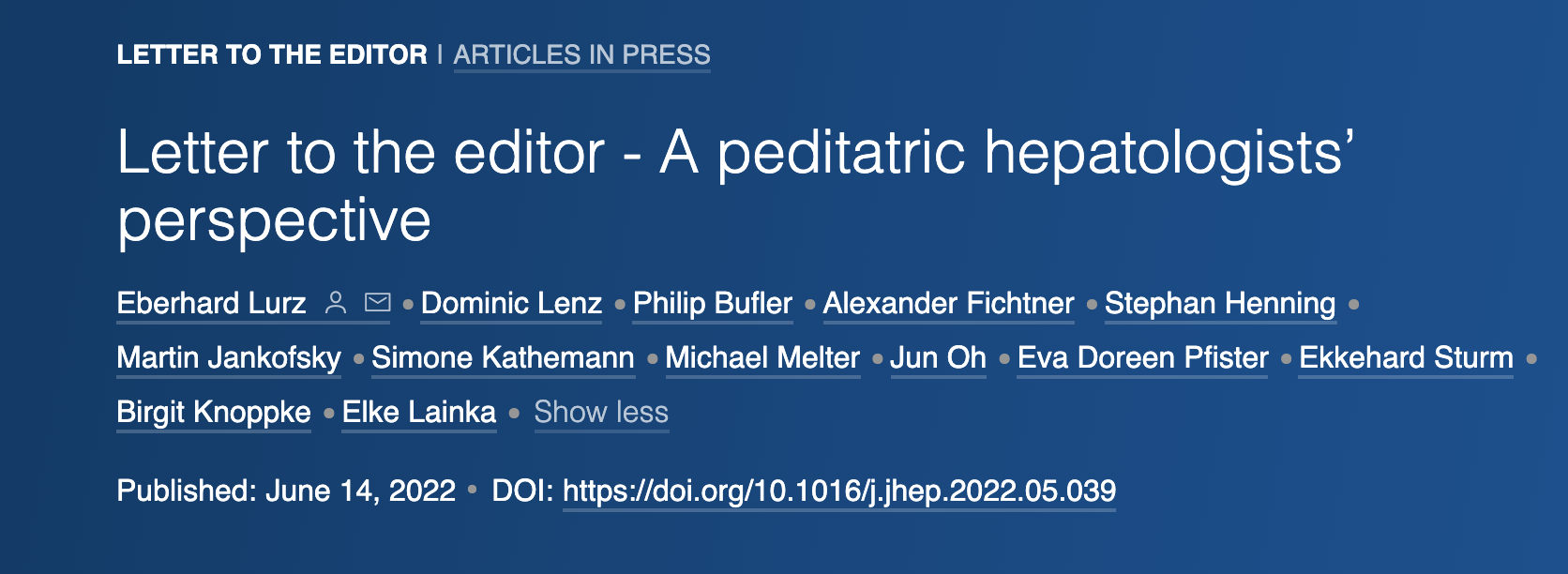On March 31, severe acute hepatitis of unknown cause was reported in Scotland for the first time. Since then, such cases have been reported in many countries or regions around the world. At the same time, some children have undergone liver transplantation and even died, which has attracted widespread attention.
So far, there are no related case reports in my country. However, in order to effectively strengthen the early identification and standardized diagnosis and treatment of the disease, and make every effort to improve the treatment effect, the General Office of the National Health Commission also issued the "Notice on Printing and Distributing the Guidelines for the Diagnosis and Treatment of Severe Acute Hepatitis in Children of Unknown Cause (Trial)" on June 16.
The etiology and pathogenesis of these cases are still under investigation. On June 14, local time, the Journal of Hepatology, the top international hepatology journal, published an article online jointly written by 13 experts in the field of liver disease in Germany, who were previously affiliated with the University of Frankfurt. Another article published by the hospital Marcus Maximilian Mücke and Stefan Zeuzem commented. Overall, the 13 experts recommended caution in drawing early or premature conclusions about the sensitive issue of severe acute hepatitis of unknown etiology in children. They also suggested that the previously established basic pediatric resources should be fully utilized, and a detailed clinical background investigation should be carried out from relevant professional institutions and organizations with first-hand experience of this issue.
Overall, the 13 experts recommended caution in drawing early or premature conclusions about the sensitive issue of severe acute hepatitis of unknown etiology in children. They also suggested that the previously established basic pediatric resources should be fully utilized, and a detailed clinical background investigation should be carried out from relevant professional institutions and organizations with first-hand experience of this issue.
The 13 authors are from the Department of Paediatrics, University Hospital Munich, Heidelberg University Hospital, Charité University Medical School, Hamburg University Medical Center, Essen University Medical School, Regensburg University Hospital, Hannover Medical School, and Tübingen University Children's Hospital. At the same time, these authors are members of the Childhood Liver Transplantation Working Group (GPGE) of the German Society of Pediatric Gastroenterology, Hepatology and Nutrition.
In fact, as of now, Germany is still a "bystander" and no related cases have been reported. The latest report released by the European Center for Disease Control and Prevention on June 10 shows that as of June 9, 20 countries in the European Region have reported 402 cases of acute hepatitis of unknown etiology in children aged 16 and under, none of which were epidemiologically related. Among them, 2 in Austria, 14 in Belgium, 1 in Bulgaria, 2 in Cyprus, 7 in Denmark, 7 in France, 6 in Greece, 13 in Ireland, 5 in Israel, 31 in Italy, 1 in Latvia, 14 in the Netherlands, There are 5 cases in Norway, 8 cases in Poland, 15 cases in Portugal, 1 case in the Republic of Moldova, 1 case in Serbia, 36 cases in Spain, 9 cases in Sweden and 224 cases in the United Kingdom.
The European Centre for Disease Control and Prevention mentioned that the majority of cases (77.9%) were children aged 5 years or younger. Out of 402 probable cases, 250 reported outcome information, of which 181 have recovered and 68 are still receiving treatment. Of the 239 cases with information, 87 (36.4%) were admitted to the intensive care unit. Of the 192 patients for which information was available, 17 (8.9%) underwent liver transplantation. There was 1 death related to the disease.
The report also mentions that the number of reported cases continued to increase from week 51 in 2021, followed by a sharp rise, reaching the maximum observed in weeks 12 and 13 in 2022. However, because severe hepatitis may take time to develop further after initial symptoms, and because investigations take time, case reporting may be delayed. Therefore, the recent drop in cases is difficult to explain at this time. In their latest article, the 13 above-mentioned authors from Germany mentioned that, due to the detrimental health effects of severe acute hepatitis, accompanied by death or the need for liver transplantation, it is indeed very worrying and further more precise work is needed. On May 13, at the annual meeting of the German Association for Childhood Digestion, Liver and Nutrition (GPGE) in Rostock, Germany, a group of German pediatric hepatologists and representatives from the German Children's Liver Transplant Center discussed some recent Report.
In their latest article, the 13 above-mentioned authors from Germany mentioned that, due to the detrimental health effects of severe acute hepatitis, accompanied by death or the need for liver transplantation, it is indeed very worrying and further more precise work is needed. On May 13, at the annual meeting of the German Association for Childhood Digestion, Liver and Nutrition (GPGE) in Rostock, Germany, a group of German pediatric hepatologists and representatives from the German Children's Liver Transplant Center discussed some recent Report.
In this meeting, the expert consensus concluded that it is too early to describe a new "wave" of severe cases of non-AE hepatitis. They believe that these latest clusters are similar in number and distribution to children with acute severe hepatitis or acute liver failure.
They also stress that the discussion of human adenovirus (hADV) infection causing these cases is particularly controversial, as no case reports of adenovirus infiltration of the liver have been reported so far.
They anticipate that changes in social behavior, and reduced exposure to pathogens as a result of various measures during the COVID-19 pandemic, may lead to changes in existing patterns of viral infection transmission as well as individual immune responses. The authors cite two papers published last year from the Children's Hospital of Zhengzhou University in China and teams from Belgium, Switzerland, the Netherlands, etc., that during the COVID-19 pandemic, respiratory syncytial virus (RSV) and influenza-induced morbidity among children Respiratory morbidity has dropped significantly. They believe that these observations and data support this hypothesis.
The 13 authors also cite a 1923 paper in the top medical journal JAMA that researchers found an increase in the number of cases of severe hepatitis and gastrointestinal symptoms after the 1918 influenza pandemic.
The authors also highlight that it is of concern that the potential association of these currently reported cases of severe acute hepatitis in children with unexplained causes with previous SARS-CoV2 infection may lead to hepatitis, which may lead to a higher susceptibility of the liver, as well as to be affected by any Overwhelming inflammation occurs with other viral infections. They caution that a similar situation can be seen in so-called seronegative autoimmune hepatitis or hepatitis-related aplastic anemia cases.
The authors say they agree with Mücke and Zeuzem's conclusions in a previously published article and support the activities of health agencies such as WHO, the European Centre for Disease Control and Prevention and local authorities to collect more and more accurate data in a timely manner. Mücke and Zeuzem had primarily combed through what was known at the time, focusing on adenovirus infection.
But the authors also stated, "We recommend caution in drawing early or premature conclusions on this sensitive issue, as to date, to our knowledge, at least within the German and European Reference Networks (ERNs), no unexplained emergencies have emerged. Significant increase in severe childhood acute hepatitis or acute liver failure.
In order to map possible cases to the correct clinical context, the authors strongly recommend making use of established paediatric infrastructure, such as the European Reference Network Rare Liver (ERN RARE-LIVER), and the German Society for Digestion, Liver and Nutrition in Children and Resources from expert bodies such as the European and North American Society of Pediatric Gastroenterology, Hepatology and Nutrition (ESPGHAN, NASPGHAN). The authors believe that members of these associations and organizations have first-hand experience with the issue.
So far, there are no related case reports in my country. However, in order to effectively strengthen the early identification and standardized diagnosis and treatment of the disease, and make every effort to improve the treatment effect, the General Office of the National Health Commission also issued the "Notice on Printing and Distributing the Guidelines for the Diagnosis and Treatment of Severe Acute Hepatitis in Children of Unknown Cause (Trial)" on June 16.
The etiology and pathogenesis of these cases are still under investigation. On June 14, local time, the Journal of Hepatology, the top international hepatology journal, published an article online jointly written by 13 experts in the field of liver disease in Germany, who were previously affiliated with the University of Frankfurt. Another article published by the hospital Marcus Maximilian Mücke and Stefan Zeuzem commented.
 Overall, the 13 experts recommended caution in drawing early or premature conclusions about the sensitive issue of severe acute hepatitis of unknown etiology in children. They also suggested that the previously established basic pediatric resources should be fully utilized, and a detailed clinical background investigation should be carried out from relevant professional institutions and organizations with first-hand experience of this issue.
Overall, the 13 experts recommended caution in drawing early or premature conclusions about the sensitive issue of severe acute hepatitis of unknown etiology in children. They also suggested that the previously established basic pediatric resources should be fully utilized, and a detailed clinical background investigation should be carried out from relevant professional institutions and organizations with first-hand experience of this issue.The 13 authors are from the Department of Paediatrics, University Hospital Munich, Heidelberg University Hospital, Charité University Medical School, Hamburg University Medical Center, Essen University Medical School, Regensburg University Hospital, Hannover Medical School, and Tübingen University Children's Hospital. At the same time, these authors are members of the Childhood Liver Transplantation Working Group (GPGE) of the German Society of Pediatric Gastroenterology, Hepatology and Nutrition.
In fact, as of now, Germany is still a "bystander" and no related cases have been reported. The latest report released by the European Center for Disease Control and Prevention on June 10 shows that as of June 9, 20 countries in the European Region have reported 402 cases of acute hepatitis of unknown etiology in children aged 16 and under, none of which were epidemiologically related. Among them, 2 in Austria, 14 in Belgium, 1 in Bulgaria, 2 in Cyprus, 7 in Denmark, 7 in France, 6 in Greece, 13 in Ireland, 5 in Israel, 31 in Italy, 1 in Latvia, 14 in the Netherlands, There are 5 cases in Norway, 8 cases in Poland, 15 cases in Portugal, 1 case in the Republic of Moldova, 1 case in Serbia, 36 cases in Spain, 9 cases in Sweden and 224 cases in the United Kingdom.
The European Centre for Disease Control and Prevention mentioned that the majority of cases (77.9%) were children aged 5 years or younger. Out of 402 probable cases, 250 reported outcome information, of which 181 have recovered and 68 are still receiving treatment. Of the 239 cases with information, 87 (36.4%) were admitted to the intensive care unit. Of the 192 patients for which information was available, 17 (8.9%) underwent liver transplantation. There was 1 death related to the disease.
The report also mentions that the number of reported cases continued to increase from week 51 in 2021, followed by a sharp rise, reaching the maximum observed in weeks 12 and 13 in 2022. However, because severe hepatitis may take time to develop further after initial symptoms, and because investigations take time, case reporting may be delayed. Therefore, the recent drop in cases is difficult to explain at this time.
 In their latest article, the 13 above-mentioned authors from Germany mentioned that, due to the detrimental health effects of severe acute hepatitis, accompanied by death or the need for liver transplantation, it is indeed very worrying and further more precise work is needed. On May 13, at the annual meeting of the German Association for Childhood Digestion, Liver and Nutrition (GPGE) in Rostock, Germany, a group of German pediatric hepatologists and representatives from the German Children's Liver Transplant Center discussed some recent Report.
In their latest article, the 13 above-mentioned authors from Germany mentioned that, due to the detrimental health effects of severe acute hepatitis, accompanied by death or the need for liver transplantation, it is indeed very worrying and further more precise work is needed. On May 13, at the annual meeting of the German Association for Childhood Digestion, Liver and Nutrition (GPGE) in Rostock, Germany, a group of German pediatric hepatologists and representatives from the German Children's Liver Transplant Center discussed some recent Report.In this meeting, the expert consensus concluded that it is too early to describe a new "wave" of severe cases of non-AE hepatitis. They believe that these latest clusters are similar in number and distribution to children with acute severe hepatitis or acute liver failure.
They also stress that the discussion of human adenovirus (hADV) infection causing these cases is particularly controversial, as no case reports of adenovirus infiltration of the liver have been reported so far.
They anticipate that changes in social behavior, and reduced exposure to pathogens as a result of various measures during the COVID-19 pandemic, may lead to changes in existing patterns of viral infection transmission as well as individual immune responses. The authors cite two papers published last year from the Children's Hospital of Zhengzhou University in China and teams from Belgium, Switzerland, the Netherlands, etc., that during the COVID-19 pandemic, respiratory syncytial virus (RSV) and influenza-induced morbidity among children Respiratory morbidity has dropped significantly. They believe that these observations and data support this hypothesis.
The 13 authors also cite a 1923 paper in the top medical journal JAMA that researchers found an increase in the number of cases of severe hepatitis and gastrointestinal symptoms after the 1918 influenza pandemic.
The authors also highlight that it is of concern that the potential association of these currently reported cases of severe acute hepatitis in children with unexplained causes with previous SARS-CoV2 infection may lead to hepatitis, which may lead to a higher susceptibility of the liver, as well as to be affected by any Overwhelming inflammation occurs with other viral infections. They caution that a similar situation can be seen in so-called seronegative autoimmune hepatitis or hepatitis-related aplastic anemia cases.
The authors say they agree with Mücke and Zeuzem's conclusions in a previously published article and support the activities of health agencies such as WHO, the European Centre for Disease Control and Prevention and local authorities to collect more and more accurate data in a timely manner. Mücke and Zeuzem had primarily combed through what was known at the time, focusing on adenovirus infection.
But the authors also stated, "We recommend caution in drawing early or premature conclusions on this sensitive issue, as to date, to our knowledge, at least within the German and European Reference Networks (ERNs), no unexplained emergencies have emerged. Significant increase in severe childhood acute hepatitis or acute liver failure.
In order to map possible cases to the correct clinical context, the authors strongly recommend making use of established paediatric infrastructure, such as the European Reference Network Rare Liver (ERN RARE-LIVER), and the German Society for Digestion, Liver and Nutrition in Children and Resources from expert bodies such as the European and North American Society of Pediatric Gastroenterology, Hepatology and Nutrition (ESPGHAN, NASPGHAN). The authors believe that members of these associations and organizations have first-hand experience with the issue.



Comments